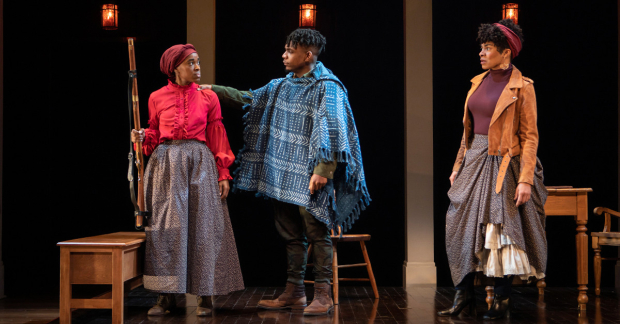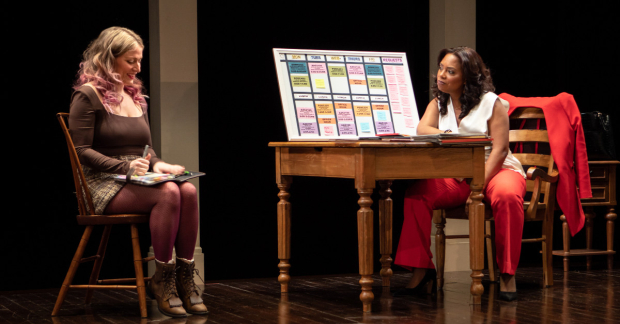Review: Past and Present Embrace in Dominque Morisseau's Confederates

(© Monique Carboni)
Dominique Morisseau's Confederates joins a group of modern plays that use plantation imagery to illustrate the legacy of American slavery on the present. Along with Slave Play, An Octoroon, and several others, one could also include the very recent Tambo and Bones, with which Confederates shares a temporal playfulness.
"Playfulness" might seem like an inappropriate word to use in relation to a work that deals with America's most egregious horror, but Morisseau and director Stori Ayers don't want Confederates, now running at the Pershing Square Signature Theatre, to be all seriousness. Instead, they and a terrific cast inject healthy doses of humor and satire into the script. Like Slave Play, which gets a name-check in the opening speech, Confederates lowers our guards and engages us in uncomfortable material with laughter.
That's not an easy thing to do when the play begins with a modern-day university professor named Sandra (Michelle Wilson in a sterling performance) showing us a very unfunny image of her face superimposed on a photograph of an enslaved woman suckling a white baby. Images of slavery don't offend Sandra, but she demands to know who tacked this defaced photo to her office door.
Could it have been Malik (Elijah Jones, in one of two adroit performances), a Black student who is disgruntled about a grade she gave him on a paper and who thinks she might be biased against men? Or was it Candice (a scene-stealing Kenzie Ross), a white student who is, like, so aware of her privilege but has mixed feelings about Sandra wearing a Black Lives Matter shirt to class? Or maybe it was Jade (forcefully played by Andrea Patterson), a fellow Black colleague who has gotten word that Sandra might not have her back when it comes time to vote for her tenure.

(© Monique Carboni)
Alternating scenes with this narrative is the story of Sara (an impassioned and sometimes riotous Kristolyn Lloyd), an enslaved woman determined to escape from her oppressor's plantation by any means necessary. With seamless costume changes designed by Ari Fulton, Jones, Ross, and Patterson transform from contemporary characters into those that populate Sara's world. Her brother Abner (Jones) is a Union soldier who has escaped slavery but rejects Sara's desire to take up arms because that's not a woman's place. Missy Sue (Ross) is the daughter of the plantation owner who wants more than just Sara's "friendship" if she can keep the upper hand. And Luann (Patterson) is an enslaved woman who's sleeping with Missy Sue's father, but she has her own rebellious plot in mind.
Rachel Hauck's scenic design, featuring columns that suggest both a plantation facade and the halls of academe, allows these two stories to switch seamlessly from one to the other with minimal set changes. Once things get going, the play follows a predictable pattern of Sara's struggle for freedom mirroring Sandra's very different quest for liberation from the suffocatingly racist, patriarchal, and classist systems often found in institutions of higher education. To drive the point home, Morisseau has these two worlds gradually blend: Sara picks up a ballpoint pen from Sandra's desk, and characters from Sara's time wear some of their modern counterparts' clothes. The message is clear: Regardless of time or place, freedom has been something that, in some form or other, Black women in America have always had to fight for.
With its dual timelines and near allegorical characters, Confederates is a departure from Morisseau's straightforwardly realistic works like Skeleton Crew, which recently ran on Broadway, but it does share her talent for spot-on dialogue, and for humor that pops out of nowhere. Humor is a tricky task here, and the half-chuckles and second-guessed laughter at the performance I attended betrayed some of the audience's ambivalence (perhaps the reason for a program insert that gives folks permission to laugh and engage out loud with the performance). But some scenes, as when Sara turns the tables on Missy Sue's passive-aggressive sexual advances, are unabashedly uproarious.
Yet the play lacks some of the human interest that we find in Morisseau's other plays. The characters in Confederates sometimes seem more like ideas than people. That's not necessarily a bad thing, but at the end of 90 minutes we feel as though we've seen something like the paper written by Malik, in which he compares the modern marketplace to a plantation — and for which he received a B-minus. The play's methodical, well-reasoned exposition pales in comparison to the arresting photograph, which we see again at the end, of a Black woman forced to nurse a child that isn't hers. She speaks the play's truth without saying a word.











